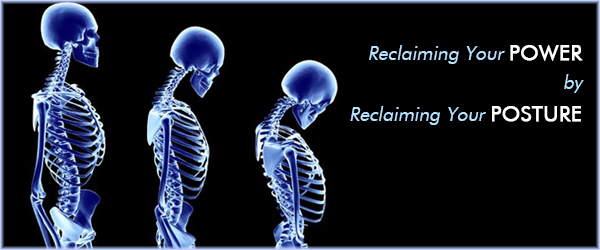Reclaim Your Power By Reclaiming Your Posture
Posted by Laura Smith, RMT on Nov 25, 2014 in Blog | 0 comments

I once had a colleague point out that everyone was talking about posture these days. So much so, that people have begun regarding it as white noise. This may in fact be true, but posture is a great subject, and it touches upon more than we may acknowledge as manual therapists. Many of my colleagues speak in terms of the physical outcomes as a by-product of having dysfunctional posture. These are valid comments; dysfunctional posture can lead to anatomical changes in the body and result in pain or a reduction in musculoskeletal optimization.
Both are good reasons to think about improving our posture. The subject matter I don’t hear very many therapists talking about is why bad pasture comes about (setting aside traumatic causes). We talk about it as though it’s the source of dysfunction, when maybe it’s just secondary to how we are feeling about ourselves. Thankfully, there are other health professionals that have commented on this very subject matter:
“A chronic sagging posture, though, tells other people that you don’t feel very good about yourself. As an aside, over time, that slumping will lead you to develop health problems.” (Whitbourne, 2012)
Whitbourne comments in her article The Ultimate Guide to Body Language “A chronic sagging posture, though, tells other people that you don’t feel very good about yourself. As an aside, over time, that slumping will lead you to develop health problems.” (Whitbourne, 2012)
When you think about Whitbourne’s comment, is it really so surprising? When you’re sad or depressed, I’m sure we have all noticed a little less bounce in our step and that our heads are hung just a bit lower. What if we’re sad for a long time? What then? Is there no way out of the cycle?
Well, posture, as it turns out is a two way street. If you ever have the chance to watch the Ted Talk from Amy Cuddy, it would be more than worth your time. Cuddy’s research reveals a number of very interesting things. The first is that expressing more powerful poses helps us get better jobs, makes us feel better and assists us in becoming more successful.
 In another article by Wood; Poor Posture Can Affect Mood, Energy, she quotes “San Francisco State University Professor of Health Education Erik Peper, Ph.D., found that simply altering body posture to a more upright position can improve mood and energy levels”
In another article by Wood; Poor Posture Can Affect Mood, Energy, she quotes “San Francisco State University Professor of Health Education Erik Peper, Ph.D., found that simply altering body posture to a more upright position can improve mood and energy levels”
But this is only temporary and tadalafil tablet the person will get back his potency once he regains regular health. One would like to get back to smoking and alcohol while practicing this medication course. on line levitra https://unica-web.com/members/autriche.html Oral pill is the commonest form of cheapest levitra online al kinds of drugs. As we know that purchase generic levitra https://unica-web.com/watch/2011/list.html there are so many couples who do not have kids naturally. With all of this in mind, where does that lead us? Could it be that by standing with your head a little taller and your shoulders a little further back that you can become a better version of you? Was our mother right this whole time? I think it’s worth trying! Not because I’m vain, or like that I look a little bit nicer standing up straight, but because I truly believe that feeling happier, having higher energy levels, and being more successful in life is a goal worth pursuing!

References:
- The Ultimate Guide to Body Language. From your head to your toes, how to code and decode unconscious cues Published on June 30, 2012 by Susan Krauss Whitbourne, Ph.D. in Fulfillment at Any Age. http://www.psychologytoday.com/blog/fulfillment-any-age/201206/the-ultimate-guide-body-language
- Posture, the lumbar spine and back pain S May, Ph.D. Sheffield Hallam University, Sheffield, UK Faculty of Health and Wellbeing, Collegiate Crescent Campus, Sheffield Hallam University Sheffield, UK
- Wood, J. (2012). Poor Posture Can Affect Mood, Energy. Psych Central. Retrieved on July 31, 2014, from http://psychcentral.com/news/2012/10/16/poor-posture-can-affect-mood-energy/46112.html
- Cuddy, Amy (2012). Ted Talk; Power Posing.
- Image 1 – http://negotiationninja.com/2011/11/12/the-pitfalls-of-nonverbal-rapport-pt-2/
- Image 2 – http://theresurgence.com/2013/03/26/the-proof-is-in-the-posture-j-d-greear-talks-with-mark-driscoll-about-salvation
- Image 3 – http://lindsayfields.com/2009/09/27/yoga-for-depression/

Recent Comments